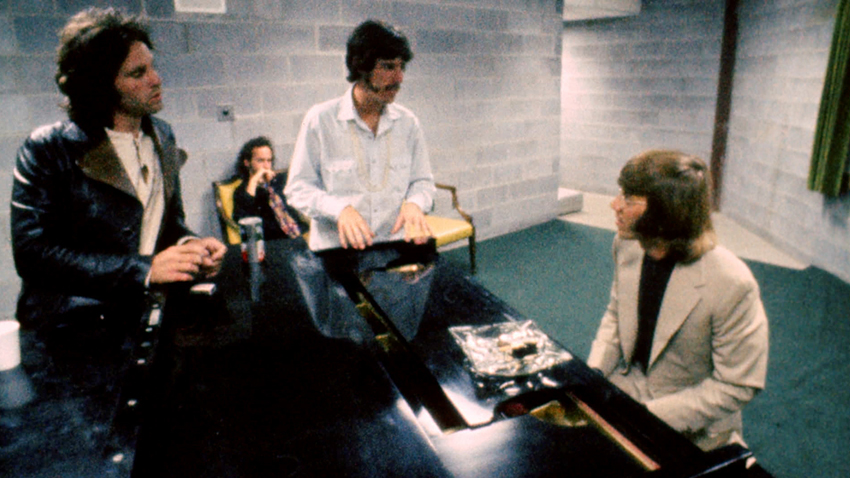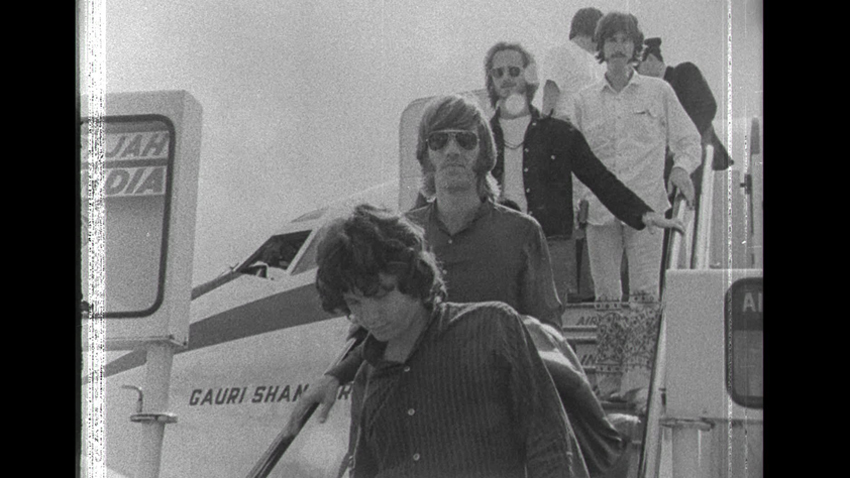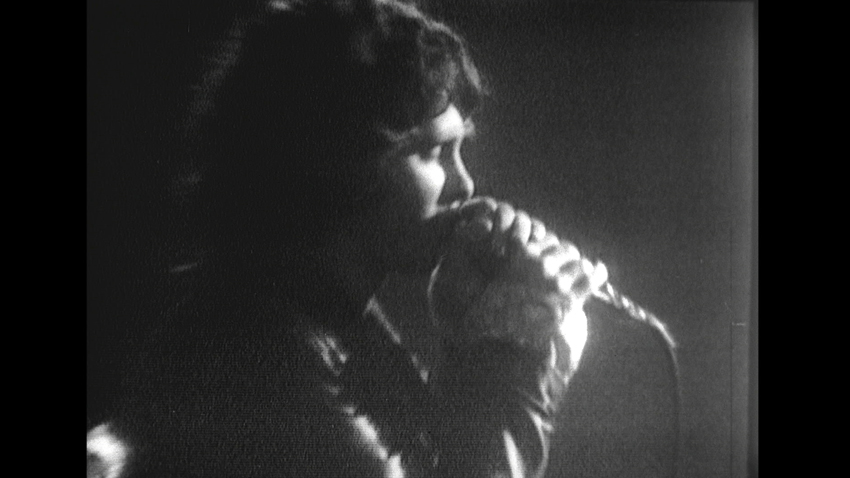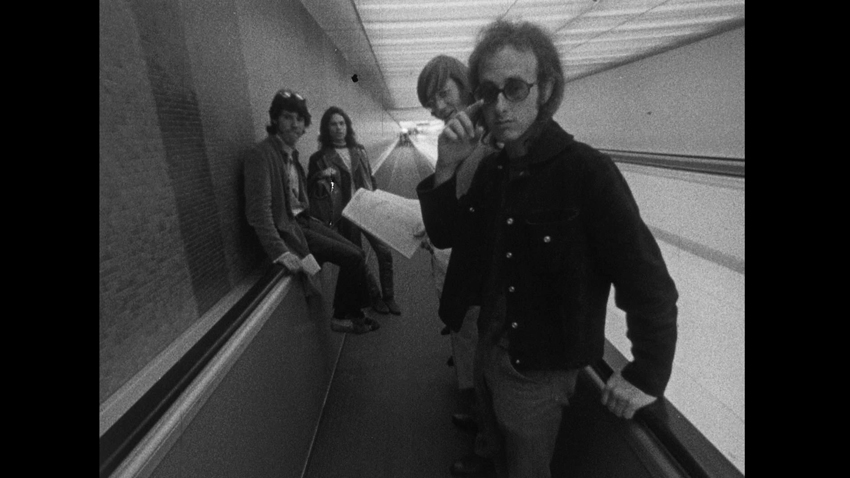
John Densmore on The Doors documentary Feast Of Friends
“People always ask me, ‘If Jim Morrison were live today, what would you be doing now?’ says Doors drummer John Densmore. "And I think we’d be doing films. Jim and Ray were both way into film, so I think we would have moved in that direction, incorporating film with music, maybe even doing soundtracks to big Hollywood movies. I know we would have gone that way had Jim lived.”
In the summer of 1968, The Doors were already making their first foray into film by self-financing a documentary directed by Paul Ferrara called Feast Of Friends. The project was never finished and was ultimately shelved when the financing ran out due to Jim Morrison's legal problems following his arrest for allegedly exposing himself to a concert audience in Miami. Since that time, the film has acquired mythic status among Doors fans, who have for years circulated poor-quality bootlegs on just about every format imaginable.
Forty-six years after it was shot, Feast Of Friends, which offers Doors fans a fascinating, behind-the-scenes cinéma vérité look at the band both off stage and in the studio, is getting a proper release on Blu-ray and DVD thru Eagle Rock Entertainment on November 11. Boasting remastered audio and video, the package also includes a spruced-up version of the 1968 British documentary The Doors Are Open, which focuses on the band's concert at London's Roundhouse theatre. Additionally, the set also features the The End, which captures the band performing their iconic song in Toronto, Canada, in August 1967, as well as interviews with Robby Krieger, Ray Manzarek, Densmore and longtime Doors manager Danny Sugerman.
The Doors' Feast Of Friends can be pre-ordered at The Doors' official website or on Amazon. In the following interview, Densmore discusses the band's interest in cinema, their subdued backstage routines and what he considers to be the group's finest performance on film.
What was the idea going in to Feast Of Friends? In one part of the film, Jim calls it a “fictional documentary." Was that a term you guys actually threw around?
“I don’t know what Jim meant by that, actually. [Laughs] Ray and Jim went to film school, and we had some friends who were filmmakers – guys like Paul Ferrara. We just thought, ‘We should document what we’re doing here. It’ll be fun and maybe be good for the future.’ That was really the thought going into it: ‘Let’s fool around making films with our friends.’”
Seems like The Doors were a year ahead of the Stones with Gimme Shelter and even The Beatles with Let It Be. The rock documentary form was still very new. Were there any films you looked to for reference?
“I don’t know if we were looking to specific films. Don’t Look Back by D.A. Pennebaker – we admired that. We were all interested in visuals, so it just seemed like a natural thing, especially, as I said, since Jim and Ray majored in film – they were kind of pushing things in that direction a little.
“I would say to Ray, ‘I’m a sucker for good visuals and sound.’ I mean, take Chariots Of Fire. That opening scene, the long shot of the runners along the beach, and then you hear that music… I think that was one of the first times synthesizers were really used in movie music. I just flipped! I didn’t even care what the story was going to be. Give me a nice marriage of sound and music.
“I’m happy with how Feast Of Friends finally turned out. It’s been bootlegged so much, and of course, the quality was always crappy with those thing. So we thought, ‘Let’s tweak it really well and get [Doors producer Bruce] Botnick to do the sound. Let’s make this thing look and sound good and put it out.’ You know, it’s not a masterpiece, but it’s really touching for me to see the late great Ray and Jim on the sailboat at the end. I’m glad the film is finally going to be out there. It's about time.”
Why did the film take so long to be released?
“Well, if Ray were here, he would answer that question: ‘Joe, it’s an alignment of the stars, a kind of cosmic occurrence. As you know, The Doors have nothing to do with linear thought; we just go with the bigger impulses of the universe.’ [Laughs] That’s the kind of answer Ray would give you.”

Wild times
“But I’ll tell you, what pleases me about this release is that the Roundhouse performance is being included. Robby and I were doing an interview the other day, and I said, ‘Hey, for years I’ve said that the BBC Granada Doors Are Open, even though it’s black and white, is our best performance on film.’ And he agreed. I’m so pleased that it’s attached as part of the package.
“Also, there’s The End from Canada. We were really young, and I think it’s a hint of where we were going. The End eventually became the encore at all of our big concerts. We would play Light My Fire, and there would be this incredible Summer Of Love ‘60s thing, and then we’d come out and bludgeon them with The End."
It wasn't the typical set-closer.
“Oh, no. It was so heavy and powerful, so the crowd would leave kind of silently without applauding. After The End, no one wanted to hear anymore – it was just so heavy. They’d file out and go home, which might have been more of a compliment than applauding. It’s interesting to watch. We were just getting our feet wet with doing that song.”
Feast Of Friends was never completed due to Jim’s legal problems at the time. How much more were you looking to do on it? Did the label ever offer to step in and help you finish it?
“Not too much more was planned at the time – I remember we didn’t have too far to go on it. The label didn’t step in, though, no. No, Jac Holzman! [Laughs] You notice in Hollywood they go over budget all the time? We were getting a little worried because we were putting a lot of money into this thing. ‘Course Ray and Jim were like, ‘So what?’ That was their world pretty much. So yeah, the project kind of stopped at a point, but what’s there is great – I’m sure glad that we have it.”
The film shows the band playing poker in a hotel room and just hanging out backstage. There's this fantasy people on the outside have that it’s always Satyricon on the road, but you guys were all rather low-key and tame almost. No shenanigans.
“That’s probably the case with heavy metal bands – oh, I’m gonna get in trouble for that, aren’t I? [Laughs] Some genres of rock ‘n’ roll attract more of the party animals. I guess the Stones partied a bit. I think The Doors were more like The Beatles backstage – friends hanging out and whatever. It wasn’t crazy. Everything was pretty subdued... unless Jim was drinking. Then we’d be worried: ‘Oh, God, is Jim gonna go over the line, or is he gonna have just the right balance?’ Of course, all of that chaos and danger kind of made us who we were.”

On Jim Morrison
Which led to problems on stage, with the cops shutting down some of the shows.
“Yeah, that’s right. Jim liked to engage the audience. He wanted to hear what they had to say. He put ‘em on the spot.”
Was that sometimes frustrating for the band as musicians? Were there times when maybe you guys just wanted to play the songs without all of the drama unfolding?
“No, not at all. We knew that Jim was magic. There’d be times when we’d be riffing on a groove, and then he’d go off and do some wild poetry or confront the audience. But the whole time we’d lay down a bed of sound and keep that going while he did… whatever was on his mind.”
The film shows Jim backstage kind of goofing around on a baby grand.
“Yeah, I love that.”
He does seem to be able to play a bit – would he ever begin songs with music?
“Oh, c’mon – he couldn’t play for shit. [Laughs] But he had a sense of timing and story. He couldn’t play one chord, but his gift was for remembering those great melodies. He had no idea how to structure a song, but what a gift to have. [Sings] ‘Be-fore you slip into unconsciousness… ‘ That’s a complicated melody. To have that in your head but not be able to play an instrument? Wow.”
I always thought that was like a Sinatra melody.
“Right, I gotcha. I remember when we did You’re Lost Little Girl, Ray said, ‘We should get this to Sinatra. He could sing it to Mia Farrow.”
Backstage, Ray is playing the piano parts to Love Street. Was he just starting to write the song then?
“I’m not sure. I think it was already written. I’m glad you mentioned that part because it’s what I miss about Ray. If you listen to his piano in Love Street, just as a musician, his articulation and touch, it’s so precise and jazz-like. I just love it. He had this style, and of course, he had these hooks [sings the keyboard part to Light My Fire] – that Bach thing he came up with. He was just so amazing, writing these carnivalesque hooks that you never forget. Robby usually had the chord to the songs, and Ray had the whipped cream to put on top.”

Backstage jams
During that sequence, you mention that there’s a string bass and a couple timpanis in another room. Would you guys ever get to jam backstage and work on material?
“Well, you know, Robby always had his guitar with him, so he’d play some blues, and I’d pound on a table or whatever. They never had a drum kit for me backstage or anything like that. This was back in the days when the rider just said ‘orange juice.’ There were no dancing girls and drum kits.”
The section with Jim talking to the “Minister at Large,” Fred L. Stegmeyer, is pretty fascinating. Jim seems to be going to great pains to explain the band’s performance style to the man.
“Yeah. That the bishop took the risk of coming to one of our concerts, and he would’ve gotten his hands slapped by his church if they knew – we loved that. He was so interesting, a ‘Minister At Large’ – what is that? We were certainly interested in spirituality and mysticism and all that. Here’s this man of the cloth coming to a rock concert – it was just great. And here’s this lead singer, the wild and sexy, leather-clad Jim Morrison, and a priest having an intellectual discussion about the other world… how great.”
The studio footage of the band recording Wild Child is terrific.
“It is. I love that track.”
You guys seemed to be scrutinizing each section as you went. You didn't play it all the way through?
“We were just trying to sort out the beginning of the song and the end. Once we got going, we knew what we were doing. But we layered the intro – the bass came in four bars later or something – and then in the end Jim wanted that ‘Remember when we were in Africa’ with a crash. That wasn’t easy because I had to hit that crash right at the button of the song, and everybody had to stop and be silent for the cymbal to ring. That’s what you’re seeing, us hashing out the intro and the exit.”
What was going on during that sequence in Hawaii where Jim is outside a venue? He's dancing and performing for the crowd – it's very lighthearted.
“The Aloha spirit! [Laughs] Just the smell of all of those flowers can get you high. Hawaii is so charming. Jim was just having a good time. You know, Jim got laid – no, I mean, he got a lei! Ba-dum-tsh! [Laughs] Or maybe it was both…”
Joe is a freelance journalist who has, over the past few decades, interviewed hundreds of guitarists for Guitar World, Guitar Player, MusicRadar and Classic Rock. He is also a former editor of Guitar World, contributing writer for Guitar Aficionado and VP of A&R for Island Records. He’s an enthusiastic guitarist, but he’s nowhere near the likes of the people he interviews. Surprisingly, his skills are more suited to the drums. If you need a drummer for your Beatles tribute band, look him up.
